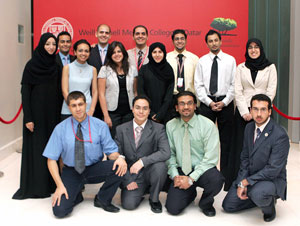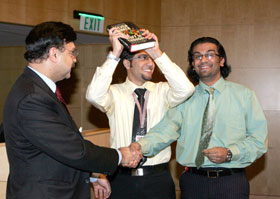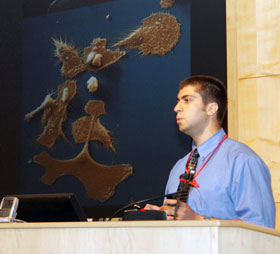Student talent promises "a good future" for research in Qatar
October,2007

"A good future for research" in Qatar - students
who presented at the 2007 Medical Student
Research Forum.
From asthma to protein crystallization and from Alzheimer's to the wispy gene, some of WCMC-Q's top medical students ranged far and wide across the landscape of biomedical research at the fourth Annual Medical Student Research Forum, October 23.
The event showcased the talent of some 20 budding scientists in a series of 10-minute oral presentations in front of an invited audience, followed by a poster session.
For the first time, prizes were awarded to those students judged by a committee of senior faculty to have made the most outstanding presentations.
The research projects were carried out by Year Two medical students, for the most part in the laboratories of leading investigators at Weill Cornell Medical College in New York City; and by Year One medical students, who worked with top teams on Cornell University's main campus in Ithaca.
Introducing the event, Vice Dean for Research, Dr. Javaid Sheikh said student research is part of a broader effort to build a sustainable research enterprise in Qatar, through partnerships between Cornell University, Weill Cornell Medical College in New York and in Qatar, Hamad Medical Corporation (HMC), the National Health Authority and Qatar Foundation's National Research Fund (QNRF).

Mohamed El Shazly (center) and Nigel Pereira,
Class of 2010, celebrate their first prize with
Vice Dean for Research, Dr. Javaid Sheikh.
The summer research fellowships, awarded annually by competition, are an opportunity for WCMC-Q students to interact with the broader scientific community and to participate in cutting edge research with teams of investigators.
Recently, there has been a shift towards projects relevant to Qatar. Dr. Sheikh also placed emphasis on training the students to communicate their research to the wider community - "explaining the real-world application of their findings."
Mohamed El Shazly (Class of 2010), who shared first prize in the oral presentations section with Nigel Pereira, worked on genetic polymorphisms in diabetes in the lab of Dr. Ronald G. Crystal, professor and Chairman of the Department of Genetic Medicine at Weill Cornell in New York.
Understanding the genetics could lead to improved ways to manage the disease, which affects up to 15 percent of the population in Qatar, notably by developing 'personalized medicine,' El Shazly explained.

Mohamed-Ali Babi: Better understanding of the
genetic basis of a chronic condition such as asthma
could lead to better management of patients.
Mohamed-Ali Babi (Class of 2010) was supervised by Dr. Lotfi Chouchane, WCMC-Q professor of genetic medicine, and of microbiology and immunology, in a study of asthma in an Arab population.
As with the diabetes project, a better understanding of polymorphisms within a gene implicated in severe asthma could lead to screening of families and hence to better management of patients, Babi said.
Both investigations included studies of patients in Qatar in collaboration with HMC.
Prize-winner in the poster section, Zahrae Sandouk (Class of 2011) said she took a lot from her research experience.
"I learned so many skills, such as protein preparation and extraction. I also learned massively from the professional investigation team I worked with in the lab," said Sandouk, who was supervised by Dr. Linda Nicholson, associate professor of molecular biology and genetics at Cornell University.
Commenting on the depth and breadth of the research, Dr. Sheikh said: "The standard is first-rate - there is a lot of talent here."
The reaction from Dr. Imad Khaddouri, special projects officer for QNRF, was also positive: "The students were excellent and their capability in giving a presentation, never mind the science, was very impressive. With such potential, there's a good future here for research activities."
Prize winners:
Oral presentations
First prize: Mohamed El Shazly, Nigel Pereira
(joint winners) - Sponsor: Dr. Ronal G. Crystal, Department of
Genetic Medicine, Weill Cornell Medical College
Second prize: Anas Saleh - Sponsor: Dr.
Robin Davisson, College of Veterinary Medicine, Cornell University
Posters
Zahrae Sandouk - Sponsor: Dr. Linda Nicholson, Department of Molecular
Biology and Genetics, College of Agriculture and Life Sciences, Cornell
University; and
Adam Khader - Sponsor: Wyeth Research, Collegeville, Pennsylvania.
